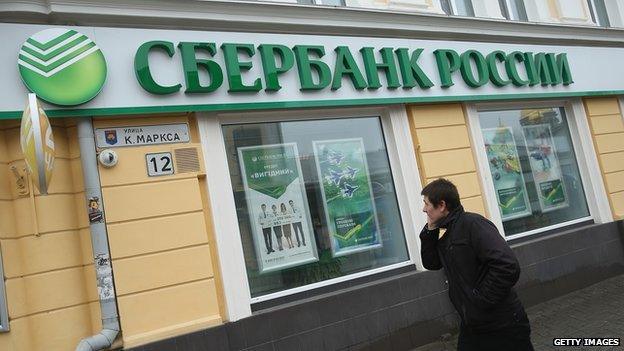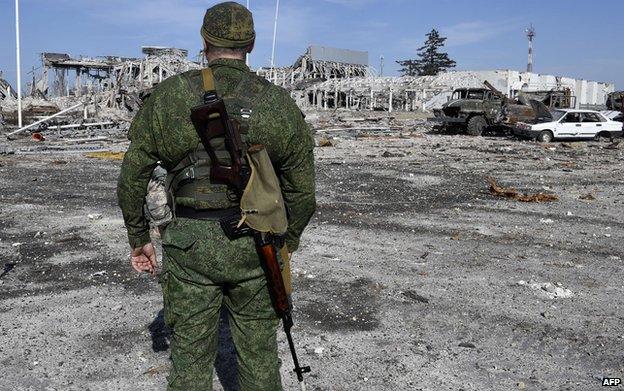Ukraine crisis: US strengthens sanctions on Russia
- Published

Sberbank can only get short-term loans in the US now
The US government has imposed new sanctions on major Russian banks, defence and energy companies.
The measures, external are part of a joint effort with the European Union aimed at punishing Russia for what they say is its military intervention in Ukraine.
They come despite a fragile ceasefire holding in the east of the country.
The Russian foreign ministry denounced the new sanctions as "another hostile step in line with the confrontational course" taken by the US .
"Of course, our retaliatory measures will not keep you waiting," it said.
The sanctions announced on Friday, external mean that US citizens will not be able to provide loans lasting longer than 30 days to Sberbank, Russia's biggest bank.
They will also affect Rostec, a major technology and defence firm, and technology for Russia's oil industry.

Luhansk airport - now controlled by pro-Russian rebels - was devastated by fighting
"Given Russia's direct military intervention and blatant efforts to destabilise Ukraine, we have deepened our sanctions against Russia today, in concert with our European allies," said US Treasury Secretary Jacob Lew.
"These steps underscore the continued resolve of the international community against Russia's aggression."
Both the EU and US say the sanctions can be eased if progress is made on the ground towards peace.
'Lasting settlement'
Nato says Russia still has about 1,000 heavily armed troops in eastern Ukraine and about 20,000 more near the border.
Russia denies sending direct military help to the rebels, insisting that any Russian soldiers there are "volunteers".
Mr Lew said: "It is essential that Russia work with Ukraine and other international partners to find a lasting settlement to the conflict. If Russia does so, these new sanctions could be suspended".

More than 100 top Russian officials and rebel leaders in Ukraine are subject to EU and US visa bans and asset freezes.
The US sanctions block support or technology for Arctic and offshore exploration by five Russian energy firms - Gazprom, Lukoil, Rosneft, Surgutneftegaz and Transneft.
Rosneft was already listed under a previous round of sanctions and is included in the EU sanctions list.
Russia has ambitious plans for Arctic oil exploration. Western partners including ExxonMobil and BP are already involved in multi-billion-dollar projects in Siberia.
The EU sanctions, external also block the export of oil services and deep-water technology. Transneft is also on the EU list, along with Gazprom Neft, the oil unit of gas giant Gazprom.
Their access to financial markets will be restricted - a serious matter for Rosneft, which last month asked the Russian government for a $42bn (£25.2bn) loan.
Kremlin warning
In the EU and US, big Russian state-owned banks are now barred from getting loans with a maturity longer than one month.
Reacting to the EU sanctions, Russian President Vladimir Putin warned that they could undermine the ceasefire in Ukraine.
"I don't even understand what these latest sanctions are about," he said. "Maybe someone is unhappy that the process is taking a peaceful path."
Russian Foreign Minister Sergei Lavrov said Moscow would "react in a calm and appropriate way, first and foremost, proceeding from the need to defend our interests".
Earlier a Russian presidential aide, Andrei Belousov, said cars imported from the EU could be targeted in retaliation, especially second-hand cars.